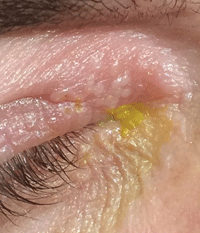Q: A 32-year-old white male with a history of cold sores presented with an itchy upper eyelid and a cluster of small blisters or vesicles. What’s the differential diagnosis?
 |
“Differential diagnoses of such a presentation include allergic dermatitis, herpes zoster dermatitis (shingles), atopic dermatitis, staphylococcal blepharitis or chickenpox,” says David Coulson, OD, of Barnet Dulaney Perkins Eye Center in Phoenix.
In this patient’s case, the telltale history of cold sores and appearance of itchy vesicles on the eyelid suggest a diagnosis of herpes simplex virus type 1 (HSV-1), sometimes called oral herpes. Type 2, or genital herpes, is a different form of the same virus.
Take note that the terms oral herpes and genital herpes are generalizations because either virus can cause genital herpes—although HSV-1 does so less commonly.
However, that is changing. “HSV-1 is now estimated to be responsible for up to half of new cases of genital herpes,” Dr. Coulson says.1
 |
|
|
Note the whitish vesicles on the inflamed eyelid. This, along with a cold sore on the lip, indicate a diagnosis of herpes simplex virus type 1 (HSV-1).
|
HSV-1 is extremely common. Most Americans will be exposed to this virus in their lifetimes. An estimated 50% to 60% of Americans in their 20s and 30s, and 85% age 60 and older, are currently infected with HSV-1.2 (Interestingly, seroprevalence of both types of HSV appears to be declining in the US.3)
“The vesicles represent active viral shedding and are contagious,” Dr. Coulson says. “For those who are seronegative (not yet infected), the virus must enter through broken skin or mucous membranes. Also, infected individuals can be contagious, even in the absence of visible signs or symptoms. So, wear gloves when examining these patients.”
However, he adds, “it is rare for this presentation to spread into the eye, although the exact incidence is not known.”
Primary HSV infection often occurs in childhood and lasts two to three weeks. Recurrent infections, affecting more than one-third of the world’s population, last about one week.
Q: How do I treat the patient? Do I need an infectious disease consult?
“An infectious disease consult need only be considered in complicated infections, or for immunocompromised patients with severe infections,” Dr. Coulson says. Otherwise, you can treat or monitor these patients yourself.
To that end, he says, “Although most infections are self-limiting, antiviral treatment for HSV infections can shorten the duration of symptoms and reduce the occurrence of recurrent outbreaks.”
• Oral drugs include acyclovir, famciclovir and valacyclovir.
• Topical dermatologic ointment formulations of acyclovir are available in 1% and 5% concentrations, but they are less effective than the oral form.
Ophthalmic acyclovir ointment (Zovirax ointment, GlaxoSmith-Kline) is not available in the US. However, Zirgan ophthalmic gel (gangciclovir, Bausch + Lomb) may be considered for prophylaxis—but be sure to discuss with the patient the substantial cost of the drug and the low incidence of keratoconjunctival involvement, Dr. Coulson says.
“Most herpetic infections in patients presenting to the office are recurrent, and an infection like this would be expected to resolve within a week,” he says. “If not, instruct the patient to return right away.”
1. Wald A. Genital HSV-1 infections. Sex Transm Infect. 2006 Jun;82(3):189-90.2. Bradley H, Markowitz LE, Gibson T, McQuillan GM. Seroprevalence of herpes simplex virus types 1 and 2—United States, 1999-2010. J Infect Dis. 2014 Feb 1;209(3):325-33.
3. Xu F, Sternberg MR, Kottiri BJ, et al. Trends in herpes simplex virus type 1 and type 2 seroprevalence in the United States. JAMA. 2006 Aug 23;296(8):964-73.

